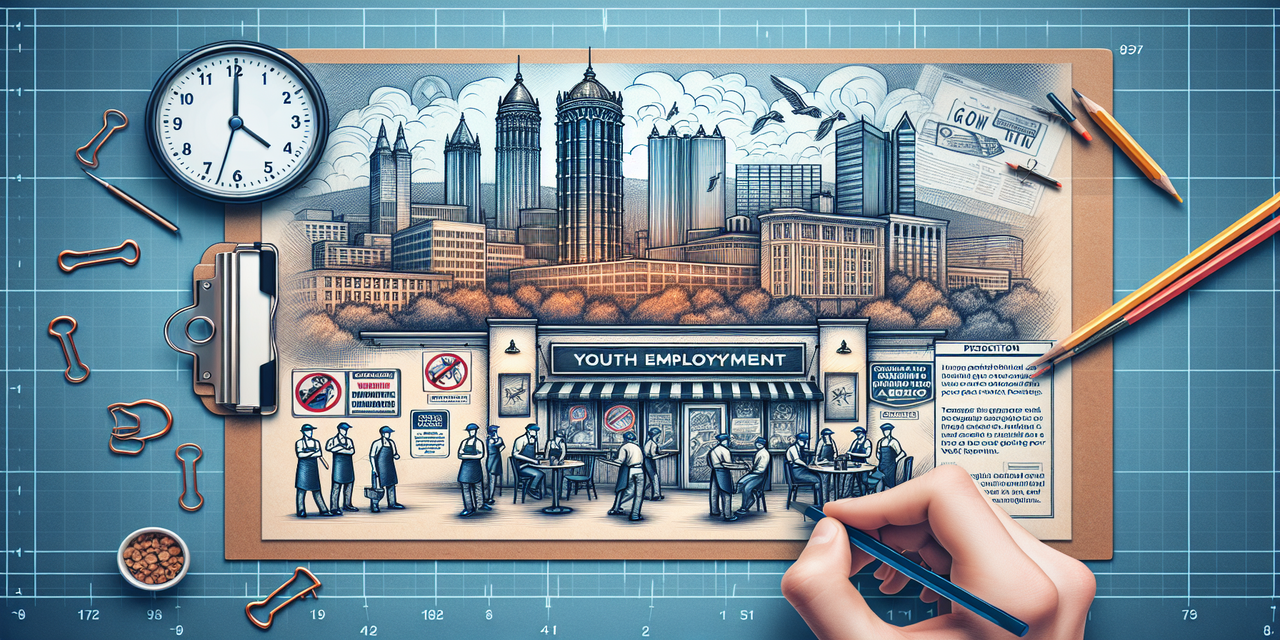Georgia Youth Employment Laws for Restaurants: Key Takeaways
- Minors aged 14-15 have strict limits on work hours and require employment certificates; 16-17-year-olds face no state hour restrictions and no permit requirements.
- Prohibited duties for minors under 16 include hazardous tasks like operating power-driven machinery, working over open flames, and working in freezers or meat coolers.
- Minors under 18 cannot operate hazardous equipment, serve alcohol, or drive on public roads as part of their restaurant jobs.
Understanding Georgia's youth employment rules is essential for restaurants hiring minors to ensure legal compliance and workplace safety.
This article outlines work hour limits, permit requirements, and prohibited duties specific to underage restaurant workers in Georgia.
For help crafting compliant ads for youth roles, review our age requirement guidance.
1. Work Hours for Minors in Georgia Restaurants
Youth employment laws in Georgia strictly regulate the working hours of minors, particularly those aged 14 and 15.
When school is in session, 14- and 15-year-olds may work up to 3 hours on school days, up to 8 hours on non-school days, with a maximum of 18 hours per week.
Their work hours during school days are limited between 7:00 a.m. and 7:00 p.m.
When school is not in session, minors aged 14 and 15 can work up to 8 hours daily and up to 40 hours weekly, from 7:00 a.m. to 9:00 p.m. (between June 1 and Labor Day).
For minors aged 16 and 17, Georgia enforces no state restrictions on work hours, aligning with federal law.
Work Hour Exceptions and Notes
Although Georgia law doesn’t mandate breaks, employers should be mindful of fatigue and overall safety when scheduling youth employees.
Parents’ consent cannot supersede state and federal work hour restrictions.
To prevent wage violations, learn about off-the-clock risks for restaurants.
2. Work Permit Requirements for Minors in Georgia Restaurants
Employment certificates, commonly referred to as work permits, are mandatory for minors aged 14 and 15 before commencing any work in Georgia.
This certificate verifies the youth’s eligibility to work and compliance with labor laws.
For 16- and 17-year-olds, Georgia does not require work permits.
How to Obtain Work Permits
Work permits can be typically acquired through schools or local labor departments.
Employers should confirm receipt of the permit before allowing minors to begin work.
When advertising these positions, follow job posting compliance standards.
3. Prohibited Duties for Minors in Georgia Restaurant Employment
Safety is paramount when employing youth in restaurants, and Georgia law lists specific hazardous occupations minors are barred from performing.
Minors under 16 must not engage in hazardous tasks such as operating power-driven machinery, cooking over open flames, loading or unloading goods, or working in freezers and meat coolers.
Instead, they may undertake office and clerical tasks, cashiering, non-hazardous kitchen work, and general cleaning and maintenance that exclude hazardous equipment.
Entry-level back-of-house support like a busser role can be appropriate.
All minors under 18 are prohibited from operating hazardous equipment including meat slicers, dough mixers, and power-driven bakery machinery.
Additionally, they are forbidden from driving motor vehicles on public roads in the course of their jobs and from serving or selling alcoholic beverages.
Employer Responsibilities for Enforcing Prohibited Duties
Restaurant owners and managers must ensure minors are assigned only permissible tasks.
Regular safety training and clear task delegation are crucial to maintaining compliance and protecting young workers.
4. Other Important Considerations for Youth Employment in Georgia Restaurants
Georgia does not mandate meal or rest breaks for minors, but best practices encourage providing reasonable breaks to maintain health and productivity.
For front-of-house support, consider a food runner role for tasks within legal limits.
Parental consent does not override the legal restrictions on minors’ work hours or prohibited duties.
Violations of Georgia’s child labor laws can result in penalties including fines up to $1,000, imprisonment for up to 12 months, or both for each offense, underscoring the importance of strict adherence.
5. Compliance Tips for Restaurants Hiring Minors in Georgia
- Verify age and obtain required work permits for 14- and 15-year-olds before employment starts.
- Schedule youth workers strictly within allowed hours, especially distinguishing between school-in-session and out-of-session periods.
- Assign only non-hazardous duties compliant with Georgia's labor laws for minors.
- Maintain clear documentation of permits, work hours, and assigned duties.
- Train supervisory staff on youth labor laws and safety precautions.
Many teams also rely on a hostess job description to define safe duties for minors.
6. Legal Resources for Georgia Youth Employment in Restaurants
For authoritative, up-to-date information on youth employment laws, consult these resources:
- Georgia Department of Labor - Child Labor Work Hour Restrictions
- U.S. Department of Labor - Youth & Labor Restaurant Safety Resources
- Georgia Department of Labor - Child Labor Hazardous Occupations
Quick-service employers should review the fast-food worker job description to assign appropriate tasks.
Georgia Youth Employment Laws for Restaurants: Conclusion
Adhering to Georgia's youth employment laws is essential for restaurants to maintain a safe and compliant workplace.
By respecting work hour limits, obtaining the necessary permits, and strictly prohibiting hazardous duties for minors, restaurant employers protect their young employees and avoid severe penalties.
Regularly consulting official resources ensures ongoing compliance with updates to these important regulations.


.png)

.png)
.jpg)